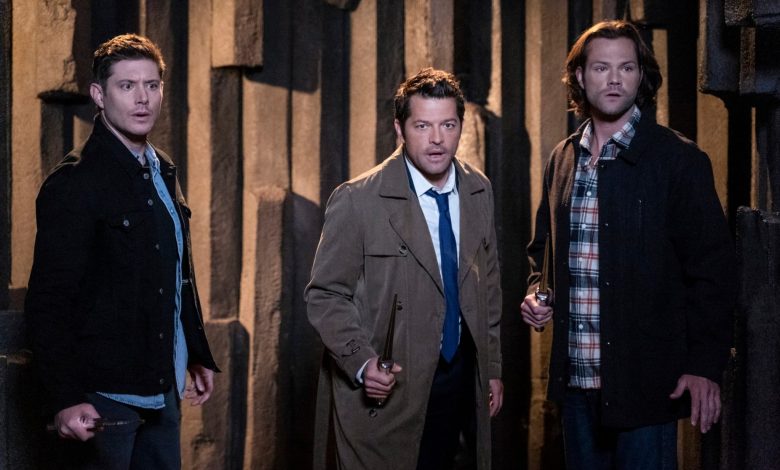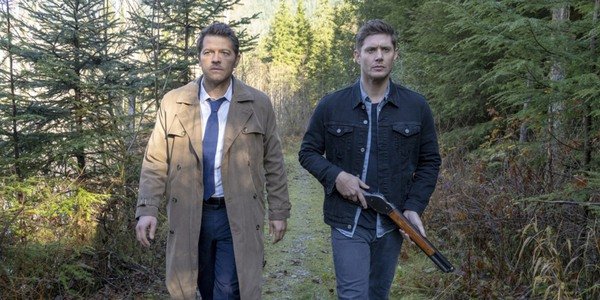Supernatural Series Finale Backlash, Explained

Tyler Kavanaugh-Lynch ‘23 /Emertainment Monthly Staff Writer
Spoilers ahead.
If you don’t want to Google anything embarrassing, here’s some thoughts from someone who’s seen all fifteen seasons.
Few shows can claim the longevity of the CW’s paranormal manpain hit Supernatural. When Supernatural’s pilot aired in 2005, Bush was president. YouTube was less than a year old, and Instagram wouldn’t exist for another five years. Gay marriage wouldn’t be federally legal for another decade. To last this long, Supernatural must have had something special that helped it amass its notorious fanbase, something that surely would be reflected in the series finale for the 1.38 million people watching. Alas, sometimes a Bush-era CW show is just a Bush-era CW show. As YouTuber Jenny Nicholson said, “The worst thing a franchise ending can do is make you feel kind of stupid and embarrassed for being so excited about it in the first place,” and this finale is a masterclass in exactly that.

Given the magnitude of the show and its charged relationship with its fans, it’s tempting to list the events that brought us to #Destiel trending above the presidential election on Twitter in the format of a Titanic disaster timeline.
On the evening of November 5, Castiel (Misha Collins) confesses his love for Dean Winchester (Jensen Ackles), and then immediately dies. Sam Winchester (Jared Padalecki)’s love interest, a deaf monster hunter named Eileen (Shoshannah Stern), dissolves, along with all life on Earth, with the exception of Sam, Dean, and Jack (Alexander Calvert), an angel-human hybrid who considers the Winchesters and Castiel his three fathers. This episode is the iceberg that capsized your Twitter feed.
On November 12’s episode, Dean tells no one at all about the confession and seems completely emotionless about Castiel’s death. Also, they defeat capital-G God and Jack takes his place. No, the context does not make it make sense.
By November 19, it was all-or-nothing. Optimists held out hope that Castiel would come back from the dead (as he had already done 5 times. Dean, on the other hand, has died 112 times.) Instead, Dean, the same Dean who just defeated God, is impaled through the chest on a rusty nail during a routine hunt. Sam marries a faceless blonde woman (Eileen is never mentioned after she dissolves, even though she resurrects offscreen.) Dean goes to Heaven, which “Cas helped” to rebuild (confirming that he, too, resurrected offscreen.) Dean says nothing about this, gets in the car, and drives until his brother succumbs to old age makeup and joins him on a bridge. Lovely.
You may, of course, scoff. What did we expect, living gay people? Meaningful diversity? And you would have a point.
Supernatural started off as a show with two white male leads who traverse the country in a vintage muscle car and investigate the paranormal underbelly of truckstop Americana. Sam was a soon-to-be Stanford graduate with an impressive LSAT score and a girlfriend he hoped to marry. Dean was the leather jacket-clad older brother, determined to rope Sam back into the monster-hunting “family business.” They visited a new place each episode, explored an urban legend, stabbed or shot something, kissed a girl, and left. The overarching plot of avenging their mother’s death by slaying a special boss demon tied together the first season. It’s very white, very straight, and egregiously misogynistic. It’s an early aughts CW show.
From these humble beginnings, the show has had a unique chance to evolve thanks to its remarkable runtime, and it does develop these characters from stock archetypes into people. Dean grows out of his demanding father’s shadow and allows himself to want stability, a place to settle down, and a person to settle down with. Sam shakes off the shame of being branded an outsider at birth and even dabbles in witchcraft, law school long-forgotten. The introduction of fan-favorite angel Castiel at the beginning of the fourth season ushered in an era of biblical lore-infused storytelling and established a third main character for the brothers to interact with (although he and Dean “do share a more profound bond.” More on that later). The show leans into themes of found family, defying fate and fathers, and what it means to exist in the world as a perpetual outsider. It’s no wonder that gay fans would start to see themselves in the characters. And given that this is still a CW show, that meant it was time for queerbaiting.
Over the course of Castiel’s 12 seasons on the show, Supernatural writers have been able to drop just enough breadcrumbs to LGBT viewers and other fans of Dean and Castiel’s relationship to keep them watching, without ever confirming anything that would alienate whatever conservative fanbase the showrunners still thought they had. Castiel raises Dean from Hell, leading to their “profound bond,” sure. Dean knows about a gay bar in Miami, sure. Castiel says “I need you,” to Dean on his deathbed, Castiel has an entire arc where he is lobotomized by his family until he tries to kill Dean (but of course can’t go through with it), Dean and Castiel have an Orpheus and Eurydice arc in Purgatory, other characters call Castiel Dean’s boyfriend, Dean compares the two of them to “Thelma and Louise,” sure, sure, sure. Nothing is ever explicit. Low-risk, high-reward.

And so it went for an entire decade. Showrunner Jeremy Carver tells Misha Collins to play Castiel as “a jilted lover,” fans placate each other with reassurances that their relationship could still become explicit in the show’s canon down the line, and Jensen Ackles and Misha Collins are doomed to years of incredibly awkward fan conventions.
Yet here we are in 2020, 327 episodes deep, the book is closed, and the characters are, well, exactly where they started. The only difference is most of them are dead now.
If the death of an openly gay character seconds after his coming out was given any amount of narrative weight, fans might still have been crushed, but the crushing would have at least been a bit more tasteful. After the (admittedly powerful) closing shot of Dean sobbing on the floor while his brother’s calls go unanswered, Castiel’s death is never given the dignity of a response. When Jack asks Dean about Castiel’s absence, Dean delivers a stony-faced couple of lines about how Castiel sacrificed himself. The romantic confession that came part-and-parcel with that sacrifice is never mentioned; not in the penultimate episode, and certainly not in the series finale, where he is mentioned exactly twice. You could break your neck rushing through a major character death like that.
If there is one good takeaway from the rabid frenzy of the past fifteen years of Supernatural fandom, the epic highs and lows of being queerbaited and then rushed through the “Bury Your Gays” trope, it’s the surprisingly productive, righteous fury. As of writing this, “The Castiel Project,” a fundraising subset of the LGBT+ charity The Trevor Project, has raised more than $53,000. Contributors are granted an opportunity to attach a comment to their donation, and many such comments are furious. Self-identified longterm fans of the show provide heaping doses of outrage: “What Supernatural has done to its queer characters is absolutely disgusting and unacceptable, and I’m talking about the show that has literally saved my life.” The overall tone of the comments, however, is one of bittersweet encouragement. One anonymous benefactor writes, “You are loved.” A $300 (yes, you read that right) anonymous donation was posted with the tag “This one goes out to a sixteen-year-old me, a sixteen-year-old bisexual who was called slurs and bullied for her entire high school career.” Another forty-dollar donation comes with the remark: “The CW can eat me. Our lives matter more than whatever money you made off of us.”
Currently, 47.5% of IMDB reviews for the final episode (which has more reviews than the past three episodes combined) give it one star out of five. Give it a watch if you need a laugh.